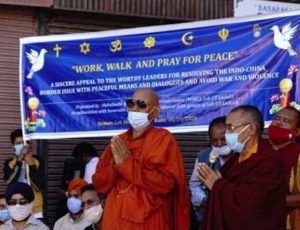
Occasionally, a meme about having one’s ducks in a row pops up in my social media feed. Rather than boast about being well-organized and truly having one’s ducks in a row, it is about being disorganized and unprepared for life:
My ducks are absolutely not in a row. I don’t even know where some of them are, and I am pretty sure that one of them is a pigeon. (Original source unknown)
We all have times in our lives when we feel this way. Life comes quickly, and losing track of your ducks can be easy. And by ducks, I mean all of the elements that are part of adult life.
Work, life, family, and friends, take your full attention. Now, add in time for spiritual practice and recreation, and you might feel over-extended. How can you possibly plan for anything that does not have a specific due date? Birthdays, holidays, anniversaries, and other similar events are knowable. You know how many days there are until the next big holiday. There can be some stress in planning for your next big celebration, yet it is more fun than planning for something like sickness and death.
The death ducks also need your attention (cue a line of ducks dressed in grim-reaper costumes). You understand the concept of death and impermanence, but it’s hard to add the prep work to your calendar, especially when others around you would rather talk about something else. Earlier this year, in a discussion with Reverend Jessica Sharp of the Joyful Death Institute, we discussed how to broach death-planning conversations in a way that makes it easier for others to participate.

A common theme in our discussion was to find a way to emphasize the positive. When you know what your loved ones want in terms of final wishes and memorial services and how to dispose of their body, you will not have to agonize over your decisions. This is a tremendous gift. My closest family members made their wishes known. In most cases, the legal documents and the burial plans were filed, and I knew how to find them. My mother even created an outline for her funeral service. I never doubted that I was doing the right thing.
By organizing these elements in advance, my family made it possible for me to grieve without being overwhelmed by paperwork and decisions.
Your loved ones will understand the value of being prepared. But they still might hesitate. My mother-in-law, who did leave us with prepaid burial services, did not purchase those services until she was 86 years old. I guess that was the point at which she began to realize that one day she would die. You can encourage open conversation and planning by speaking about your wishes. In this way, you show that it is OK to talk about death.
Reverend Jessica taught me a wise way to open up this discussion. You approach this as if you are planning a party. Instead of a birthday party, it is a death day party. You do not even have to start off calling it a death day party. But you can discuss your final party. You can share what colors you want the decorations to be, whether there should be flowers or balloons, and who should be invited. You might create a playlist. If you find yourself thinking that this approach is very indirect, remember that this is a way of opening the door and inviting others into a safe space.
After you describe your final party, ask others about their party. Find out their favorite colors, foods, and music. And if that is as far as they can go, at least you will know how to design their memorial.
As gentle as this approach is, timing is critical. You might not want to meet your partner at the door after a long day of work and say, “For my memorial service, I would like the color theme to be red and purple, and I want you to play the soundtrack from Purple Rain by Prince.” You will bring attention to a difficult topic, but you might also find yourself reassuring your partner that you are being proactive, not announcing the fact that you have a terminal illness. It is better to wait until you are both at ease.
It may take more than one attempt to discuss planning for death. My parents were fully prepared to discuss their deaths with me. At first, I was not able to engage in this important conversation. Each time I visited them, they would remind me of their wishes and how to find their paperwork, and I would sit in awkward silence just waiting for them to stop talking about death. They were persistent and, finally, I was able to listen. Eventually, I was able to ask questions and fully participate in the discussion. Because they kept trying, and because I eventually became open, I was able to receive their final gift to me.

In addition to knowing the final wishes of your loved ones, you also want to have a network or support system. You do not need a large circle of family and friends, but you do want to know that when the time comes, you will not grieve alone. Because we knew he was dying, my husband and I had the opportunity to discuss my network. He had strong opinions about some of the people we knew. In most instances, he was spot on. He knew who would be there with me and who would not. Do not be afraid to talk about who you think will or will not support you. It is not disrespectful to discuss life without your loved one. As with the final party, perhaps bring up this topic first. You might say, “When I die, I think that (fill-in-the-blank) will be the person who will be most helpful to you.”
Once the conversation starts flowing, you may learn new things about one another. Hopefully, you will see that handling uncomfortable topics now will result in less discomfort later.
By embracing the topic of death, you can bring to light your fears, preferences, and love, ensuring that when the time comes, you can celebrate life to its fullest, even in the face of loss. Take that, death ducks!
See more
Margaret Meloni: Death Dhamma
The Death Dhamma Podcast (Margaret Meloni)
Joyful Death Institute
Related features from BDG
Beyond Attachment: Understanding Clinging Versus Caring
Something Is Missing, Because Someone Is Missing
Of Rainbows and Sea Turtles: Letting Memories Guide and Heal Us
Related videos from BDG
The Death Dhamma Podcast Season 1
The Death Dhamma Podcast Season 2
The Death Dhamma Podcast Season 3
The Death Dhamma Podcast Season 4












